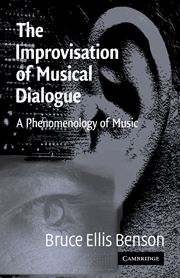FIVE - Being Musical with the Other
Published online by Cambridge University Press: 14 January 2010
Summary
Of all instrumental music, [a string quartet] is for me the most comprehensible: one hears four rational persons conversing with each other, and believes that one gains something from their discourse and becomes acquainted with the peculiarities of their instruments.
A string quartet would at least seem to be a kind of musical conversation. In playing a quartet, each member contributes to the discourse; and their contributions give the impression of forming a mutual exchange. But this immediately raises a crucial question: if a string quartet can be termed a kind of dialogue, who is speaking? Goethe implies that we hear the players themselves in conversation; but are their voices really their own? Do they speak for themselves or do they speak merely on behalf of the composer? What sorts of obligations do composers, performers, and listeners have to their dialogical others? And how is it possible to blend these voices into a genuine dialogue in which no voice is simply absorbed or drowned out by any of the others and the particularities of their respective voices are allowed to flourish?
Since music making is something that we inevitably do with others (whether they are present or not), musical dialogue is fundamentally ethical in nature. But, for there to be a genuine dialogue, then neither the composer(s) nor the performer(s) nor the listener(s) can be so dominant that the other voices are simply forgotten.
- Type
- Chapter
- Information
- The Improvisation of Musical DialogueA Phenomenology of Music, pp. 163 - 192Publisher: Cambridge University PressPrint publication year: 2003



